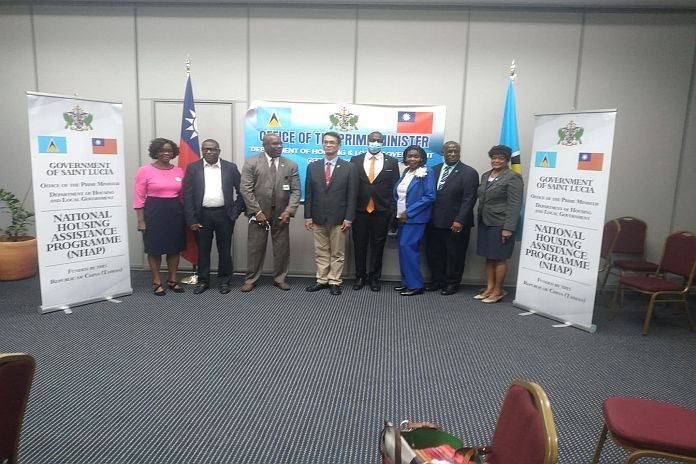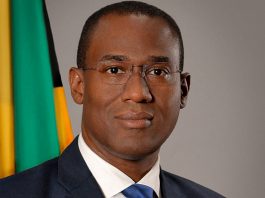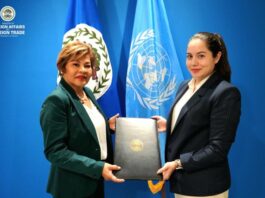By Earl Bousquet
The new Saint Lucian government led by prime minister Philip J. Pierre earlier this week announced two more deliveries on the ruling Saint Lucia Labour Party (SLP) 2021 Manifesto promises: a national house repair project and a home communications support program to connect 5,000 households to the World Wide Web.
The house repair project, announced Wednesday by housing minister Richard Frederick, involves $10,000 (US $4,000) from Taiwan to fix homes of elderly and disabled persons, later expanded to include construction of apartments and ‘affordable condos’.
The ‘Home Communication Relief Bundle’, worked out with FLOW, will see the 5,000 households pay only $20 monthly and hooked up with no installation costs, a fixed-line, 100 minutes and ten TV programs that’ll also ensure students can attend online classes.
Earlier promises delivered included decriminalization of small amounts of cannabis, erasure of ‘criminal records’ of persons convicted for small amounts and effacing similar criminal charges recorded against persons earlier convicted for violating COVID protocols like not wearing masks or violating curfew times.
The new administration also reduced direct contact between police officers and COVID protocol violators by replacing arrests with ticketing charges.
Inherited
The new administration inherited a worsening national COVID spread inspired (in great part) by open violation of protocols during the 21-day July 2021 general elections campaign that led to separate but common warnings by chief medical officer Dr Sharon Belmar George and president of the Saint Lucia Medical and Dental Association (SLMDA) Dr Merle Clark, that the eventual consequences could quite possibly be very severe.
The announcement of the arrival of the Delta variant (about a week after the election) didn’t surprise many. But what did was the attitude of the United Workers Party (UWP) behaving like it was never in charge of the war on the pandemic here and/or that the rapid increase in COVID hospitalizations and deaths after July 26 was invented by the new government.
Vice grip
Caught in the vice grip of the backlash from recent revelations that the previous administration had hurriedly agreed to a botched COVID vaccine deal that put $7.3 million in the hands of a company that failed to deliver the 100,000 doses ordered and paid-for up-front ahead of elections, the UWP has instead resorted to calling on prime minister Pierre to do more and better, but without offering prescriptions.
The prime minister and health minister have been going heads-over-heels to assure (and assuage the concerns of) those who fear the SLP-led government might introduce mandatory vaccination that there’s no such intent.
Pierre also this week assured there was no intent either, despite growing public calls, to go beyond weekend ‘Lockdown Sundays’, four of which have been observed here (from Saturday evenings to Monday mornings).
However, the government’s declared reluctance to enforce stronger measures is coming up against a growing surge of support for making vaccinations mandatory among health workers and at workplaces.
The Chamber of Commerce this week joined the Industrial and Small Business Association (SLISBA) in indicating that the majority of employers surveyed in both sectors are in favour of workplace vaccination.
Local doctors also want all health staff to be vaccinated, while others want to also see the public service – including immigration and customs officers, air and seaport employees, as well as police officers – also required to be vaccinated.
The discussion also continues here on whether teachers and students should be required to vaccinate and wear masks at school.
Saint Lucia Teachers’ Union (SLTU) president Don Howell this week indicated it’s fiercely opposed to any such thought and will strongly oppose it.
The Trade Union Federation (TUF) also issued a statement last week warning employers against requiring workplace vaccination.
Approach
The unions have so-far adopted an industrial relations approach to the vaccinations issue, which is being promoted by the government as part of a global, regional and national health emergency, insisting on protecting the individual rights of members vis-à-vis the government’s duties and responsibilities to the national whole, including teachers.
The unions claim any requirement for workplace vaccinations will amount to a unilateral amendment of workers’ contracts, while employers favouring vaccination cite protection of staff and customers, many also saying the very future of their businesses rely on keeping them COVID-free.
Catch 22
The political parties, government, trade unions and private sector entities are in a veritable Catch 22 situation, each saying and doing as expected, but all equally aware that COVID has changed every aspect of life and work, introducing the likes of Work-at-Home and Home-Schooling mechanisms never expected.
The UWP, which lost the July poll by winning only two of the 17 seats contested (and losing nine of the 11 it won in 2016) is still nursing the wounds of its second-worst defeat since the historic 16-1 drubbing in 1997 by the SLP, under Dr Kenny D. Anthony’s leadership.
Careful
The SLP has been busy managing a careful transition, with little if any complaints of political retribution or vendettas.
The first such claim has been that the new administration is seeking to replace the chief executive officer of the controversial Citizenship by Investment (CIP) project, but that wouldn’t surprise anyone who’s been following the positions of the UWP and SLP administrations on transparency and accountability in related parliamentary declarations required by law.
The CIP’s leadership, under the UWP, absolutely refused to disclose – though legally required – the amounts raised through citizenship passport sales in the secret escrow account for Asia, of which the Malaysian-born Master Developer behind the controversial $2.8 billion Pearl of the Caribbean project in Vieux-Fort, Teo Ah-Khing, is allegedly the sole signatory.
Challenge
But while Pierre’s administration seems more intent on delivering at least one election promise at or between every sitting of parliament since taking office nine weeks ago, their unavoidable main challenge continues to be leading the national COVID-19 battle on all fronts.
The prime minister has been taken to task by the Voice newspaper (the island’s oldest) to which, on September 25, 2021, the editorial chided him for what it considers too early a blanket government promise not to require mandatory vaccination when the world seems heading precisely in that direction – and warning he could also end-up (eventually) eating his words.
Indeed, other governments everywhere have had to revisit similar earlier positions, given regional and international actions towards ensuring increased global vaccination levels approved by the World Health Organization (WHO), the Pan American Health Organization (PAHO), the Caribbean Public Health Agency (CARPHA), the national Health Ministries across the Caribbean Community (CARICOM) and the Organization of Eastern Caribbean States (OECS).
Daily reality
Mandatory vaccination is a daily living reality in Canada, the UK and the USA and with Antigua and Barbuda, Grenada and Guyana having made vaccinations required in the public service (or sections of it) and especially at schools.
With children generally unprotected, many (if not most) parents are naturally concerned about students interacting with unvaccinated teachers, but teachers’ unions tend to equalize such parental concerns with the ‘right’ of individuals to not vaccinate and possibly endanger themselves and others.
Those opposing workplace vaccination also tend to knowingly dismiss their responsibility to respect the equal rights of the vaccinated to be protected, whether by the employer or the state.
Not easy…
It’s not an easy call for any of the stakeholders, but in the absence of a reliable ‘How To’ manual on handling COVID, all need to give and take – and also expect the unexpected. But try telling that to some of those citizens who voted UWP, many still caught in the long post-election hangover following a humiliating electoral defeat that left their party reduced to a 15-2 minority in parliament.
Not all UWP supporters are die-hard deniers of the reality that regime change is as hard to accept by every losing party, but many still nurse that election migraine all of ten weeks after, delaying the agony of eventually having to come to grips with their party’s bad loss.
Vaccine choices
The new prime minister, a professional accountant who insists his administration’s COVID-19 policy will continue to be directed by advice from health and medical personnel and guided by ‘Science’, has commendably ignored the critics and instead proceeded to launch a quiet COVID vaccine diplomacy drive that’s seen the island add Pfizer vaccines (donated by Washington) to double the local choice from only Oxford-AstraZeneca.
With news that Cuba has now made over 900,000 of its Abdala vaccines available to Venezuela, there’s increasing hope that the Cuban vaccines – being eagerly and anxiously awaited across the region by thousands of Saint Lucian, OECS and CARICOM citizens – will become available sooner than later, to add to local choices.
Likewise, PAHO has an agreement with China’s Sinovac for the wider Latin American and Caribbean region (The Americas) that should also be eventually available to Saint Lucia, which, alongside Cuba’s Abdala, would also add to the region’s vaccine choices.
Investigations
But until then, another hard choice facing the Pierre administration is when and how to start delivering on its election promise to undertake investigations to make those who wasted and personally benefitted from corrupt practices accountable.
The government has set the legal stage for official investigations into the handling of government finances relating to the St Jude hospital and the Hewanorra International Airport between 2016 and 2021, but apart from increasing calls to widen the investigative scope, many are also demanding the government move faster or do more to show its serious about tackling corruption.
As per usual, most of those demanding scalps and advocating justice, in legally unjust ways will offer endless reasons for advocating the government should ‘Arrest dem all!’; but Pierre has been particularly mindful that bowing to such pressure or playing to that gallery would be not only mindless but also politically costly.
But the pressure is on from the public for the new administration to show a demonstrated preparedness to start acting against elected parliamentarians found, after full and open investigations, to have engaged in financial misbehaviour or malfeasance while in office.
People first
With an increasing embrace of the almost perennially-present negative feeling that ‘politicians’ are generally unwilling to introduce anti-corruption laws that can eventually ensnare them, many here also believe the nation may be in for more of the same.
But here again, Pierre is not the traditional politician of that type, having instead an unusual reputation of never having been accused of corruption (in private or political life) during his six consecutive terms as a member of parliament for Castries East – a character a top UWP spokesperson cited (during 2021 the election campaign) as making him ineligible to lead a government.
Prime minister Pierre’s honesty held against him in such instances never influenced voters in his constituency and on Monday, starts his eighth week heading the new Cabinet of ministers along lines that have thus far shown a clear intent to be less antagonistic and more engaging, even seeming more prepared to err on the side of caution than to go in expected directions, while delivering on promises made based on the SLP’s election theme of ‘Putting People First’.
Pierre and his new administration, like everywhere else, after fundamental regime change in decisive elections that resulted in such overwhelming mandates – will also (and most likely sooner than later) have to face unexpected challenges that will test their ability to balance between governing to please the most and their duty and responsibility to serve all by placing the common good above all else.
No less
The newly-elected administration owes no less to all citizens equally, including those who opposed the SLP on election day and those who still loudly advocate against vaccination.
That much the prime minister must be quite aware of.
And, also from experiences here and everywhere that stunning electoral victories like his party’s, also come with expectations higher than any ceiling from everyone, all of which can’t be fulfilled overnight (and some never), requiring that he also makes haste slowly in some instances, to quicken the ultimate pace of delivery.




